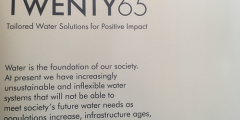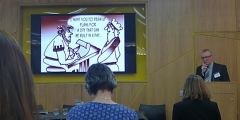How are transport networks going to become more resilient to flood risk?
November 30, 2017
In this blog, Dr David Dawson examines flood risk on the physical transport network and some potential developments for improving urban flood risk by connecting multiple infrastructure systems. Plumber, ‘Sorry Transport Secretary, you have a leak!’ Transport Secretary, ‘Well, how bad is it?’ The Issue The extent of flood risk across our transport networks is …
The Anthropogenic Catchment
October 25, 2017
In this blog, Greg O’Donnell and colleagues at Newcastle University explore the transition to the urban catchment, and the resulting effects on hydrology. Cities have hydrological impacts both within their boundaries and beyond. Through the conversion of the landscape from permeable to impervious surfaces, runoff dynamics are changed resulting in more flashy responses in urban …
Malmö: two decades at the cutting edge of innovative water management
September 1, 2017
In this blog Shaun Maskrey investigates how Malmö became Europe’s poster child blue-green city following almost 20 years at the forefront of innovative water management. Sustainable urban drainage systems (SUDS) are a common sight in central Malmö The Issue In the late 1990s, after years of socio-economic decline and flooding as a result of overwhelmed drainage, …
Restoring the Dignity of Rivers
August 7, 2017
In this blog, Professor Colin Thorne shares with us his ‘restoring the dignity of rivers’ speech from the River Restoration Northwest Speaker Series given in Seattle, 23 May 2017. ‘everything has either a price or a dignity. Anything that has a price can be replaced by something else as its equivalent, but anything that is above all price, …
Urban Flooding and Sponge Cities Workshop, 3-5 July 2017, China
July 26, 2017
In his blog, Sangaralingam Ahilan reports on the UK-China joint workshop on ‘Urban Flooding and Sponge Cities’ at the 2017 annual conference of the International Institute for Infrastructure Resilience and Reconstruction (IIIRR) held on 3-5th July 2017 at Shenzhen, China. The workshop was co-ordinated by University of Exeter, UK and Tsinghua University, China and funded …
Learning and Action Alliances (LAA) as solutions to wicked, complex problems
June 26, 2017
In one of the previous blog posts, Emily Lawson introduced the concept of Learning and Action Alliances (LAA’s) as a solution to the ‘wicked’ problem of urban water management. The premise here is that a ‘wicked’ problem cannot be tackled from within the confines of science alone or through the mechanisms of top-down governance. This …
Low-cost small-scale blue-green interventions: community led projects enhancing urban flood resilience
May 2, 2017
You need just 5 water butts to capture an hour of heavy rainfall from a 200 m2 roof (assuming the water butt holds 200 L and rainfall intensity is 4-8 mm/hr). Imagine if that happened across every roof in the city and imagine the resources that could be provided and the costs you’d avoid – …
Twenty65 Annual Conference 2017
April 6, 2017
This week I attended the Twenty65 Annual Conference 2017 – Bringing the Water Sector Together (April 4-5th, Manchester). TWENTY65, an EPSRC research project, are working in partnership across the water sector to tailor water systems so that they deliver positive impact on health, the environment, the economy and society. The conference provided an opportunity for academics, practitioners, policy makers …
SCOT Flood Forum – 23rd February 2017
March 1, 2017
The Urban Flood Resilience team were invited to showcase their project aims, objectives and case studies at the February meeting of the SCOT Flood Forum. This was a great opportunity for the ‘Achieving Urban Flood Resilience in an Uncertain Future’ (UFRM) research project to introduce its wide reaching research team (including social scientists from the Open …
Risk, Resilience and Response in a changing Climate
February 1, 2017
The ‘Risk, Resilience and Response in a changing Climate’ conference was held in Glasgow on the 31st January and hosted by Impact Engagement. A diverse audience of Scottish planners, flood risk officers, local authority representatives, SEPA (Scottish Environmental Protection Agency), Scottish Water, Scottish Power (SP Energy), Scottish Government, the Scottish Flood Forum and SNIFFER attended, creating …











Recent Comments